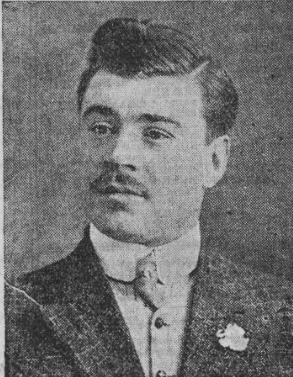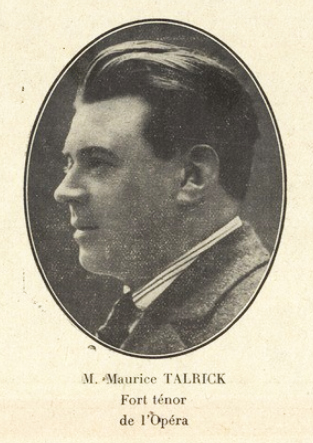He was one of the busiest Arnold interpreters ever, "Asile héréditaire" was considered his
masterpiece, and in actual performances, he was frequently secure (and crazy) enough to repeat the aria, sometimes even twice:
it's such a pity that Maurice Talrick never recorded. (He also used to repeat "Rachel, quand du Seigneur"!) Though he sang
primarily in smaller provincial theaters, he got a huge number of rave reviews, was praised for his
top notes, for his musicality, for his acting; he was called the true successor of Imbart de la Tour, Cossira and
Jérôme, and some critics considered him the only tenor of his
time who could sing the "old" French repertory (like Raoul, Fernand or Arnold).
Talrick's real name was Maurice Trosselli (he used it also on stage for many years). His parents – the father a
wallpaperer, the mother an ironer – resided in Monaco, but later (obviously after his father had died), the family moved
to St-Maurice, east of Geneva, where his mother came from.
Maurice studied voice at the Conservatoire National in Paris, then at the Geneva conservatory. Later, all newspapers that
recounted his career said he had made his debut at just 19 years old as Gounod's Faust in Geneva; obviously an attempt by the
singer to appear younger than he was. Actually, he graduated from the Geneva conservatory in 1907, and that Faust debut took
place towards the end of that year, when he was 22. In 1908, he joined the Théâtre du Capitole in Toulouse, where
he was very successful in Le chemineau and Quo vadis in 1909, then he sang in Montpellier (where he won triumphs
as Turiddu, Canio and Cavaradossi in 1910), Algiers and Antwerp. In late 1912, he sang Arnold (probably his first?) in
Algiers, then in Geneva. In 1913, he sang the same role at the Grand-Théâtre in Marseille; in the 1912/13
season in Antwerp (so that must have been the season he spent there), in February 1914 in Verviers.
It still must have been before World War I (or eventually in the early wartime) that he made his Italian debut as Manrico in
Parma, and sang in Genova, Venice and Rome with success. In March 1915, Geneva heard him as Éléazar. In 1916,
he was Fernand in May in Lausanne and in August in Bourges, and Arnold again at the Grand-Théâtre in Marseille
in November.
For two seasons (I think from 1917 to 1919), he was fort ténor at the Gaîté-Lyrique in Paris,
where he had already built a considerable repertory: L'Africaine, Il trovatore, La Juive, L'attaque
du moulin. In April 1918, he sang Fernand in Chalon-sur-Saône. In June 1919, while belonging to the troupe of the Gaîté-Lyrique, he was back to Algiers as a
guest. In 1920/21, he was a member of the troupe in Rouen.
In December 1922, he sang Arnold in Toulouse, not at the Capitole though, but at the Théâtre des
Variétés.
In 1923, he was Arnold in Reims in January, Éléazar in Lyon in February, Arnold in Geneva and Tourcoing in
March and in Perpignan and Béziers in April. In summer, he appeared again in Béziers and again as Arnold, but
this time in the open air, and in Marseille at the open-air Théâtre Silvain: another Arnold in July, and Manrico
in August (where his voice was still found too light-weight for the part). He was Arnold and
Julien in Biarritz in September, and in October Arnold in Avignon and Montpellier. On 27 October, he made his debut at the
Paris Opéra, as Manrico (it seems that he never returned). November, Arnold in Nîmes and Lyon, Fernand in
Montpellier. And in December, he was Manrico in Roubaix, Fernand in Avignon as well as Éléazar in both
Montpellier and Nancy (into January 1924). Nancy earned him a very mixed newspaper review; his first act, the critic
wrote, was sloppy, dull-voiced and far from excellent, then he improved from act to act.
In his younger years, every now and then some critic remarked that he wasn't really a fort ténor, that his
"lovely voice" was not quite dramatic enough for the repertory he sang. But at some point in the early 1920s, he changed his
name to Talrick, and his voice, too, seems to have changed considerably. His career became now extremely busy, he sang an
astonishing number of performances, and the voice must have grown heavier and larger. After 1924, his newspaper record is one
of the best that I've ever seen: hardly a superlative seemed sufficient to describe Talrick's performances, no matter which
newspaper and in which part of France.
In 1924, he appeared as Arnold in Amsterdam in January and in Casablanca in March; as Jean and Vasco da Gama in Avignon in
March; as Arnold in Verviers and Clermont-l'Hérault in May; in September, in the title role of Pétrarque
by Hippolyte Duprat in Toulon; and the rest of the year he spent singing Vasco da Gama (Montpellier in November) and mostly
Arnold: in October in Montpellier, Sète and Nantes, in November in Nantes again, in Angers, Rennes and Aix-en-Provence.
1925, it was Arnold yet again in January in Verviers and in March in Saint-Étienne. From April to November 1925,
Talrick toured India and sang all his operatic repertory there: Rodolfo, Roméo, Arnold, Raoul, Éléazar,
Werther, Gérald, Manrico, Radames and Canio.
Back home, he sang in the course of about four months in Tournai, Avignon, Saint-Étienne, Besançon and Metz
(Arnold), created Messaline for Lille and sang five performances of Guillaume Tell in Mulhouse. June 1926 found
him singing Arnold in Geneva. In November, he ventured as far as Saigon (today Ho Chi Minh City) and stayed for the whole
winter season; he appeared as Duca and Vincent, among others.
In 1927, he was a member of the Lyon opera theater, plus he sang Arnold in Agen in June, in Nice in September and in Amiens
and Verviers in November, as well as Éléazar in Troyes in October, in Verdun in November and in Aix-en-Provence
and Monte Carlo in December.
1928: Don José, Arnold and Hélion (Messaline) in Oran, Raoul in Nîmes as well as Faust in
Béziers, all in February. May, Arnold in Valence and Carcassonne. June, Manrico and Arnold at the Arènes in
Fréjus. September 1928, Arnold in Lamalou-les-Bains and Cavaradossi in Dax. October, Raoul and Vasco da Gama in
Montpellier, Éléazar and Arnold in Avignon. November, Duca in Montpellier and Arnold in Nîmes. December,
Arnold in Montpellier.
1929: February, Turiddu in Montpellier and, yet again, Éléazar in Avignon. In March, Fernand in Chambery, Arnold
in Montpellier and Jean in Tours. April, Raoul in Perpignan. May, Fernand in Montceau (with the Opéra de Lyon).
In winter 1929/30, he sang Edgardo in Nîmes and Montpellier, Arnold in Nice and Toulon. He was Edgardo in Perpignan in
the Easter season 1930. In July, he sang Jean in Hérodiade in Saintes (open air), and then went to Belgium for
the 100-year-jubilee of the country's independence, singing Masaniello in Liège, Namur (open air) and Brussels (open
air). In September/October 1930, he was back to Montpellier, earning rave reviews as Arnold, Fernand, Éléazar
and Raoul. In October, he was Arnold in Lyon and Dijon; in November, Éléazar in Dijon. In December, he was in
Lyon for La Juive, in Calais for L'Africaine, in Li&eagrave;ge and Metz for Guillaume Tell and in
Tourcoing for Messaline.
1931, Raoul in Rouen in January. August, Faust in Salies-de-Béarn. In September 1931, he died "after a short illness",
and was buried in Geneva.
 Young Maurice Trosselli
Young Maurice Trosselli
References:
- Art Lyrique Français
- Les Annales Coloniales, 9 February 1932
- Bulletin Meusien, 19 November 1927
- Comoedia, 13 September 1920, 25 September & 24 December 1923, 18 December 1927, 29 January, 30 September & 15 October 1928, 14 April 1929, 22 December 1930 & 19 January 1931
- Courrier de Saône-et-Loire, 23 April 1918 & 5 May 1929
- L'Écho d'Oran, 22 February 1928
- L'Éclair, 29 November & 13 December 1923, 22 November 1924
- L'Égalité de Roubaix-Tourcoing, 13 December 1923
- L'Est Républicain, 29/30 December 1923 & 1 January 1924
- Gazette de Lausanne, 8 October 1931
- L'Indépendent des Basses-Pyrénées, 17 August 1931
- Journal du Cher, 4 August 1918
- Journal de Genève, 28 June 1907, 27 March 1915 & 11 October 1931
- Journal de Roubaix, 15 December 1930
- Journal Suisse, 16 May 1916
- Lyrica, 1 October 1924, 1 September 1925, 1 April 1926 & 1 May 1930
- Le Mistral, 21 February 1929
- Montpellier, 12 January & 15 March 1924
- Les Nouvelles, 17 June 1919
- Le Nouvelliste, 9 October 1931
- Le Petit Dauphinois, 14 March 1929
- Le Petit Marseillais, 17 August 1923
- Le Petit Méridional, 16 November 1928 & 23 February 1929
- Le Petit Troyen, 6 October 1927
- Le Progrès de la Côte-d'Or, 23 Novemer 1930
- Saïgon Sportif, 26 November 1926 & 21 January 1927
- Les Tablettes d'Avignon et de Provence, 22 June 1930
- La Vie Montpelliéraine, 11 & 25 February/2 June/6 & 20 October 1928, 30 March 1929
Picture source (top): Les Tablettes d'Avignon et de Provence, 29 September 1928
Picture source (bottom): Comoedia, 27 November 1908

